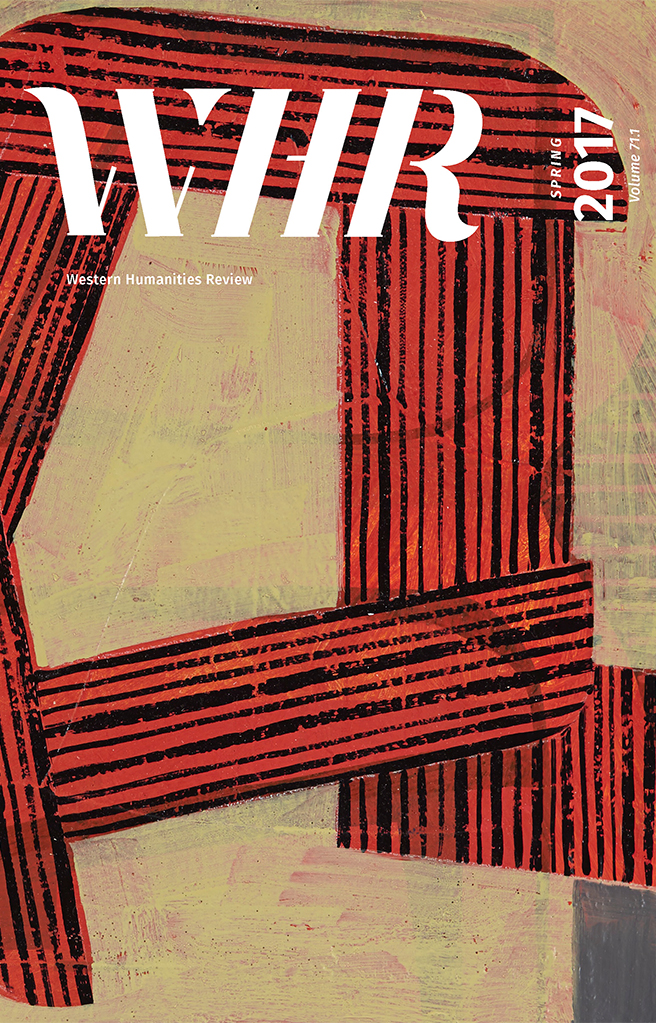Editor & Fiction Editor – Michael Mejia
Poetry Editors – Katharine Coles, Craig Dworkin, Thomas Stillinger
Nonfiction Editors – Stuart Culver, Jeremy Rosen
Managing Editor – Emily Dyer Barker
Consulting Editors – Barry Weller, Mindy Wilson
Print Design – Hailey Rabdau
Web Design – Adam Halstrom
Editorial Assistants – Eric Blix, Michelle Donahue, Tyler Goldman, Alen Hamza, Brock Jones, Kevin Priest, Joe Sacksteder
Editorial Board – Scott Black, Vincent Cheng, Norman Council, Karen Lawrence, Michael Martone, Stephen Tatum
Cover Image – Tom Burckhardt, Extension Rig, 2015, oil paint on cast plastic, 16 x 20 inches, with permission of the artist, ©Tom Burckhardt.
Editor’s Note
The seasons slip by and we can barely keep up. We are not keeping up. We are falling behind. Slipping and stumbling on a wretched path littered with obstacles—or distractions—reports on the death of empathy.
But why hide behind metaphor? We are human and slow after all, and nevertheless want to provide, to give all we can to whoever’s left out there, to you, in need, we think, just like us, of some sign of affect and wonder and pain, of, yes, the apt, the surprising metaphor that articulates under-the-skin experience in all its complex nuance that we cannot otherwise name but by writing out its curious evidence.
In this issue of Western Humanities Review, we congratulate the winners of the 2017 Mountain West Writers’ Contest, Aditi Machado for poetry and Kathleen J. Woods for prose, and we are pleased to share their award-winning writing with you, as well as the fine work of contest runners up Michael Martin Shea and Janice Margolis, poetry and prose, respectively. Many thanks to all the contestants and to our judges, Mónica de la Torre and Brian Evenson, for turning their discerning and illuminating eyes on our finalists.
This issue also seems, perhaps, unusually concerned with some specific peculiarities of brain and mind, the material emblem and the mysterious, ineffable architecture of ourselves—Amy Bagan’s “The Deviant Mind,” Christine Poreba’s “The Mind’s Mansion,” JoAnna Novak’s “Two Brains,” the fictions of David Crouse and Les Myers, featuring characters experiencing a loosening of sanity’s bonds, and Kyle Ellingson’s CEO, whose appearance of corporate rationality masks much more complex and unknowable impulses and motivations. These are the most obvious examples of the phenomenon, but they are not nearly alone.
Maybe I’m overly fond of Breton’s presentation of “madness”—a model for Surrealism—as a window into what he deemed the tragically lost world of our imagination, into the anarchic, liberating, revolutionary potentialities of the subconscious, surrendered, or at least tamed, in youth for the sake of a safer, bourgeois communal living—of servitude. “This imagination which knows no bounds is henceforth allowed to be exercised only in strict accordance with the laws of an arbitrary utility; it is incapable of assuming this inferior role for very long.”
The imagination abandons most of us as we mature and go to work, Breton laments, arising spectrally only in the shadows of dreams, or even more corruptly in our nostalgic, inaccurate memories of childhood.
“No, it was not yet these who would be ready to create the Revolution.”
But the mad, Breton says, “victims of their imagination,” set free from “certain rules…which we are all supposed to know and respect,” experience “a profound indifference to the way in which we judge them,” allowing us “to suppose that they derive a great deal of comfort and consolation from their imagination, that they enjoy their madness sufficiently to endure the thought that its validity does not extend beyond themselves.”
This rather too gleefully elides the real, substantial, and obvious pain experienced by those who suffer from mental illness, the dementia of old age, their often terrifying experience of otherness and uncertainty, and the related suffering of those who care for them.
And yet, however misleading, even cynical, Breton’s suggestion may be—of madness’s comforting imagination, of a pleasing consolation in the alternate realities of madness—the premise of a private rationality and that one might accept that such radical alternatives to our assumptions and expectations—to our sense of what is or can be known, can be done—can exist in another human being—perhaps in oneself—that one might choose, out of love or curiosity or hope—or as an act of resistance—to embrace these alternatives, foster them, build upon them, sets the conditions for the startling empathy enacted in the works mentioned above, and in their compatriots in our pages, and in our goal here to continually reimagine our world and our practice of it.
A friend once likened his institution’s faculty to a glacier, a force of disparate materials and sympathies that inevitably grinds constitutionally less-permanent obstacles to dust. Metaphor again. But one we might usefully recall this season when considering similar relations between elected and electorate between shameless mummers who publicize their playacted Bretonian madness as a final unfettering and those who truly create and live in liberating alternatives.
Just an anecdote to recall when acknowledging, actually feeling, the empathic and principled force that binds us to each other, that creative work reminds us of, that is on our mind as we complete this issue and ready ourselves for the next.
Because we are slow—but we will never stop coming.
Spring 2017 | Volume 71.1
Jude Brancheau
Freshmen
Kathleen J. Woods
When You Are Thus Changed
Mountain West Writers’ Contest Prose Winner
Aditi Machado
Two Poems
Mountain West Writers’ Contest Poetry Winner
Michael Martin Shea
From The Immanent Field
Mountain West Writers’ Contest Poetry Runner-up
Janice Margolis
21 Days
Mountain West Writers’ Contest Prose Runner-Up
Heather Ryan
Notes to Self on Retrospection and Humor
Caroline Tracey
Sympathy for the Oregon Militia
Laura Stott
Two Poems
Stacey Levine
From MICE 1961: A Novel
Laurel Nakanishi
A Note on a Vacant Bus Seat
JoAnna Novak
Two Brains
Tom Burckhardt
Art Feature: Creative Seeing
Sophia Galifianakis
Two Poems
Kyle Ellingson
Work Life
Amy Bagan
Three Poems
Les Myers
Pruitt-Igoe
Lynn Kilpatrick and John Sproul
To Be Unnamed
Christine Poreba
Two Poems
David Crouse
The Alphabet in Reverse
Ondřej Pazdírek
Two Poems
George Kalamaras
Two Poems


